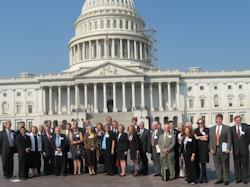 9/19/2010 -AHF helps plan Advocacy Day in US Congress, Drafts 2010 Policy Brief focused on Democracy and Human and Minority Rights ... The Central and East European Coalition (CEEC) held its Fall Advocacy Day - an all-day event during which the members visited scores of Congressional offices, including the Senate Foreign Relations Committee (SFRC), to discuss key policy issues relating to Central and Eastern Europe. These issues included human and minority rights concerns relative to Hungarians in the region, U.S. assistance, Russia's influence, NATO and energy security, and visa matters. 9/19/2010 -AHF helps plan Advocacy Day in US Congress, Drafts 2010 Policy Brief focused on Democracy and Human and Minority Rights ... The Central and East European Coalition (CEEC) held its Fall Advocacy Day - an all-day event during which the members visited scores of Congressional offices, including the Senate Foreign Relations Committee (SFRC), to discuss key policy issues relating to Central and Eastern Europe. These issues included human and minority rights concerns relative to Hungarians in the region, U.S. assistance, Russia's influence, NATO and energy security, and visa matters.
 The American Hungarian Federation (Federation), a lead member of the CEEC, played an active role in the event by, among other things, helping to plan it, drafting the human/minority rights section of the Policy Brief, scheduling appointments with Senate offices and the SFRC, and heading up one of the six teams that visited the Congressional offices. The American Hungarian Federation (Federation), a lead member of the CEEC, played an active role in the event by, among other things, helping to plan it, drafting the human/minority rights section of the Policy Brief, scheduling appointments with Senate offices and the SFRC, and heading up one of the six teams that visited the Congressional offices.
"It was important for our Congressional Members, Advisors, and Staff to listen and share their views about the commitment of the Congress to enhance relations between the United States and Central and Eastern Europe," said the Federation's president, Frank Koszorus, Jr. "We were pleased that the Hungarian Americans who participated were all members or officers of the Federation, (including Zoltan Bagdy, Thomas Teglassy, Christie Wagner, and Paul Kamenar), all of whom raised important issues during the discussions," he added.
Following the meetings, the CEEC sponsored a reception at the Mott House on Capitol Hill. The CEEC Policy Brief full text is below, but also available to [download].
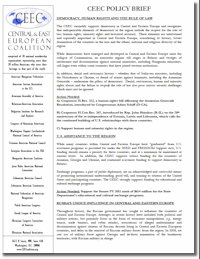 2010 CEEC POLICY BRIEF 2010 CEEC POLICY BRIEF
1) DEMOCRACY HUMAN RIGHTS AND THE RULE OF LAW
The CEEC staunchly supports democracy in Central and Eastern Europe and recognizes
that indispensable elements of democracy in the region include the respect for the rule of
law, human rights, minority rights and historical accuracy. These elements are intertwined
and especially important in Central and Eastern Europe, considering its history, Soviet
domination of the countries in the area and the ethnic, national and religious diversity of the
region.
While democracies have emerged and developed in Central and Eastern Europe since the
collapse of Communism, an autocratic regime still reigns in Belarus and vestiges of
intolerance and discrimination against national minorities, including Hungarian minorities,
still linger even within some countries that have joined western institutions.
In addition, denial and revisionist history – whether that of Stalin-era atrocities, including
the Holodomor in Ukraine, or denial of crimes against humanity, including the Armenian
Genocide – undermine the pillars of democracy. Denial, revisionism, human and minority
rights abuses and the failure to respect the rule of law also pose serious security challenges
which must not be ignored.
Action Needed:
A) Cosponsor H.Res. 252, a human rights bill affirming the Armenian Genocide
Resolution, introduced by Congressman Adam Schiff (D-CA).
B) Cosponsor H.Con.Res. 267, introduced by Rep. John Shimkus (R-IL) on the 20th
anniversary of the re-independence of Estonia, Latvia and Lithuania, which calls for
the continued building of U.S. relationships with these countries.
C) Support human and minority rights in the region.
2) U.S. ASSISTANCE TO THE REGION
While many countries within Central and Eastern Europe have “graduated” from U.S.
assistance programs as provided for under the SEED and FREEDOM Support Acts, U.S.
funding should remain a priority for these countries, and at a minimum be maintained at
current levels. In addition, the CEEC supports robust funding for the countries of
Armenia, Georgia and Ukraine, and continued assistance funding to support democracy in
Belarus.
Exchange programs, a part of public diplomacy, are an acknowledged and successful means
of promoting international understanding, good will, and training to citizens of the United
States and participating countries. The CEEC strongly supports funding for educational and
cultural exchange programs.
Action Needed:
Support the Senate FY 2011 mark of $654 million for the State
Department’s educational and cultural exchange programs.
3) RUSSIA’S UNDUE INFLUENCE IN CENTRAL AND EASTERN EUROPE
Throughout history, the Russian government has sought to influence the countries of
Central and Eastern Europe. Attempts in recent history have included both political and
military actions, but primarily focus in the form of economic manipulation (e.g., energy
transit, trade barriers, and cyber attacks), accusations of alleged maltreatment and
discrimination against citizens of Russian descent living in Central and Eastern European
countries, and delay in the removal of Russian military forces from the region. In 2008, we
saw use of military force against Georgia and de-facto annexation of the breakaway
territories, with Russian military in charge.
A pragmatic approach for U.S. foreign policy in countering Russia’s attempt in re-establishing its “sphere of influence” in the region
should consist of the promotion of democratic principles within the Russian Federation. A democratic, market-based Russia makes
for a non-aggressive and peaceful partner in Central and Eastern Europe. The Central and East European Coalition urges that U.S.
foreign policy, regarding Russia and its relations with its neighbor nations, be pursued in a forceful and proactive manner.
Action Needed:
A) Join the Congressional Caucus on Central and East Europe co-chaired by Congressmen Daniel Lipinski (D-IL) and
Thaddeus McCotter (R-MI).
B) Call on the Administration to utilize all resources to limit Russian pressure on the region.
4) NATO AND ENERGY SECURITY IN CENTRAL AND EASTERN EUROPE
The CEEC strongly supports pro-active security collaboration of the United States with allies in Central and Eastern Europe
through NATO as well as direct bilateral mechanisms. The CEEC played an important role in advocating for the successful
enlargement of NATO from the Baltic to the Black Seas. NATO remains a key factor of stability in the region, providing member
states with essential elements of political, as well as physical security. Strengthening of the alliance in all aspects should remain a
priority.
In addition to NATO, America’s policy towards CEE countries must include the facilitation of greater energy security and
economic collaboration among the CEE countries, as well as by CEE countries with the producers of energy in the Caspian region
and Middle East to ensure successful implementation of the EU’s initiative on the Southern Gas Corridor that could lead to
enhanced energy sources and economic independence of the CEE nations.
Action Needed:
A) Support the NATO aspirations of the countries of Georgia and Ukraine.
B) Increase FMF and IMET funding for Central and Eastern European countries.
C) Support energy security programs in the region.
5) VISA ISSUES
The pilot edition of the Visa Waiver Program (VWP), which allowed six EU countries from Central and Eastern Europe (the Czech
Republic, Slovakia, Hungary, Latvia, Lithuania, and Estonia) to join the VWP in 2008, expired in June 2009, leading to an
automatic reinstatement of the standard eligibility rules. These rules include requiring the aspiring country to have less than a 3
percent visa refusal rate in order to be eligible for participation in the Program (as opposed to 10 percent that was set in the Pilot).
These rules have had the unfortunate effect for millions of Americans, mostly of Polish descent, that their relatives still cannot
travel freely to the United States, regardless of years of proven, dependable friendship and loyalty to the United States in
international affairs and in combat duty. The CEEC believes that it is in the best interest of the United States to have the Visa
Waiver Program expanded, especially to countries that have demonstrated a capacity and willingness to cooperate with the United
States in achieving counter-terrorism goals.
In addition, the CEEC supports the establishment of a new P visa category to cover groups and individuals coming to the United
States for non-commercial cultural purposes at the invitation of a U.S. group with ethnic ties to the invitee’s country. This new
category includes those coming to present or teach ethnic or folk culture, music, theater, dance, or other ethnic artistic endeavors.
Action Needed:
A) Revise current provisions of the VWP to: 1) increase the visa refusal rate threshold, for example, to 15 percent as
previously proposed, and 2) allow the Secretary of Homeland Security the flexibility to include key U.S. allies in the
Program.
B) In cooperation with the Department of State and the Department of Homeland Security, revise legislation-based
guidelines that consular staff use to assess one’s purpose for visiting the United States, as well as admission quotas.
Guidelines and quotas that are currently used do not reflect today’s political and economic realities in Central and
Eastern Europe.
C) Ensure that mechanisms for measuring another key VWP eligibility provision, i.e., the overstay rate, are
successfully and completely implemented and provide accurate and timely data.
D) Introduce and support legislation to establish a new P visa category.
[< Back to CEEC news]
[< Back to all AHF news] |
[< Back to all CEEC News]
 Sign
up for the AHF mailing list. Sign
up for the AHF mailing list.
Your information is not shared!
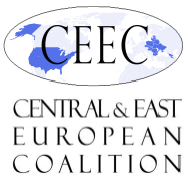
CEEC member organizations:
American Hungarian Federation
American Latvian Association
Armenian Assembly of America
Belarusan-American Association
Bulgarian Institute for Research and Analysis
Congress of Romanian Americans
Washington Chapter, Czechoslovak National Council of America
Estonian American National Council
Georgian Association in the USA
Hungarian American Coalition
Joint Baltic American National Committee
Lithuanian American Council
Lithuanian American Community
National Federation of American Hungarians
Polish American Congress
Slovak League of America
Ukrainian Congress Committee of America
Ukrainian National Association
CEEC Policy Briefs
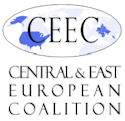 9/15/2014 - AHF participates in drafting Central and East European Coalition Fall 2014 Policy Paper. The 2014 brief addresses Ukraine; NATO and Security in Central and Eastern Europe; teh Visa Waiver Program and Immigration Reform; Energy Security; Democracy, Human and Minority Rights, the Rule of Law, and the Information War; US Assistance to and Promotion of Regional Democratic Governance; Trade and Economic democratic governance and the rule of law; Trade and Economic Integration; and Black Ribbon Day. [read more] 9/15/2014 - AHF participates in drafting Central and East European Coalition Fall 2014 Policy Paper. The 2014 brief addresses Ukraine; NATO and Security in Central and Eastern Europe; teh Visa Waiver Program and Immigration Reform; Energy Security; Democracy, Human and Minority Rights, the Rule of Law, and the Information War; US Assistance to and Promotion of Regional Democratic Governance; Trade and Economic democratic governance and the rule of law; Trade and Economic Integration; and Black Ribbon Day. [read more]
 11/25/2013 - FALL 2013: AHF participates in drafting Central and East European Coalition (CEEC) Fall 2013 Policy Paper. It includes language on minority rights: "...support the equitable and prompt restitution of properties – including private, communal, and church properties – that had been illegally confiscated by governments of CEE, from ethnic minorities and the populations at large." [read more] 11/25/2013 - FALL 2013: AHF participates in drafting Central and East European Coalition (CEEC) Fall 2013 Policy Paper. It includes language on minority rights: "...support the equitable and prompt restitution of properties – including private, communal, and church properties – that had been illegally confiscated by governments of CEE, from ethnic minorities and the populations at large." [read more]
 5/29/2012 - AHF participates in drafting CEEC Policy Brief on minority rights and NATO expansion and issues multiple action alerts including: Supporting S. 2177, the NATO Enhancement Act, introduced by Sen. Richard Lugar to encourage
further enlargement of NATO and to deepen U.S. strategic partnerships with NATO allies. [read more] 5/29/2012 - AHF participates in drafting CEEC Policy Brief on minority rights and NATO expansion and issues multiple action alerts including: Supporting S. 2177, the NATO Enhancement Act, introduced by Sen. Richard Lugar to encourage
further enlargement of NATO and to deepen U.S. strategic partnerships with NATO allies. [read more]
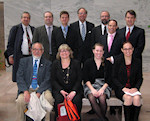 4/13/2011 - American Hungarian Federation drafts Central and East European Coalition 2011 Policy Brief, helps organize Advocacy Day on Capitol Hill.., In its continuous effort to raise issues important to the Hungarian American community, the American Hungarian Federation (AHF) participated in an April 13 Advocacy Day organized by the Central and East European Coalition (CEEC). The Advocacy Day involved meetings with key staffers in both the Senate and House of Representatives in the U.S. Congress. [read more] 4/13/2011 - American Hungarian Federation drafts Central and East European Coalition 2011 Policy Brief, helps organize Advocacy Day on Capitol Hill.., In its continuous effort to raise issues important to the Hungarian American community, the American Hungarian Federation (AHF) participated in an April 13 Advocacy Day organized by the Central and East European Coalition (CEEC). The Advocacy Day involved meetings with key staffers in both the Senate and House of Representatives in the U.S. Congress. [read more]
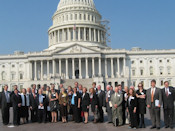 9/23/2010 - AHF helps plan CEEC Advocacy Day in US Congress, drafts 2010 Policy Brief addressing Democracy and Human and Minority rights. 9/23/2010 - AHF helps plan CEEC Advocacy Day in US Congress, drafts 2010 Policy Brief addressing Democracy and Human and Minority rights.
[read more]
Links
Downloads on NATO
 Most of these are .PDF files. If you do not have the free Adobe Reader, click the icon. Most of these are .PDF files. If you do not have the free Adobe Reader, click the icon.
- April 29, 2003 - US Senate Testimony: "NATO Enlargement: Promoting Western Values, Strengthening the Alliance." Calling attention to minority protections. before the United States Senate Committee on Foreign Relations.
- March 25, 2009 - US Senate Reception on the Occasion of the Policy Reception in Honor of NATO and Its Enlargement - : Remarks of Frank Koszorus, Jr.
- April 2009 - CEEC statement on NATO Enlargement and Supporting the Open Door Policy.
- July 2007 - Hungary's Accession to NATO: An expanded report by Frank Koszorus, Jr.
- October - November 1997: The Debate on NATO Enlargement:
Hearings Before the U.S. Senate Committee on Foreign Relations. Testimony of Frank Koszorus, Jr., President, AHFDC. An interesting exchange with Sen. John Kerry.
- June 20, 1996 - U.S. Policy Toward NATO Enlargement: Hearing before the Committee on International Relations,
United States House of Representatives 104th Congress, Second Session: Testimony of Frank Koszorus, Jr., President, AHFDC.
- June 2007 - Hudson Institute Panel: Enduring Strains of Communism
in Central and Eastern Europe
- March 29, 2004 - On the Occasion of NATO Expansion, Corcoran Gallery of Art. AHF Remarks by Frank Koszorus, Jr.: NATO
Enlargement and Minority Rights
- October 24, 2003 - AHF Memorandum on Romanian President Iliescu Visit
Join online!

[<< back to all AHF news] |



